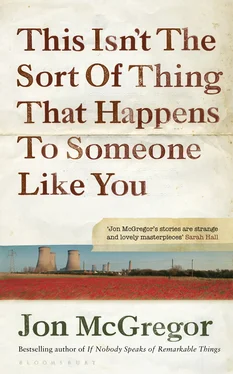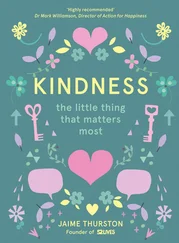‘The way she looks at you?’ he repeated. He seemed amused. The toaster popped up, and she put it down again.
‘And the way she won’t answer my questions,’ she added. Michael made a noise in the back of his throat, something like a snort or a stopped chuckle. A harrumph, people would once have called it. She’d married a man who harrumphed at her across the breakfast table. The toaster popped up a third time. She brought the toast to the table and passed it over to him. ‘What’s she doing here, Michael?’ she asked, sharply. ‘What’s she doing in our house? She could be anyone. We don’t even know her name.’ He finished buttering his toast before replying, and she saw, in his expression, that same infuriating self-assurance which the American woman had shown her.
‘First,’ he said, ‘it’s not our house. It’s a vicarage. It belongs to the church, and we’re guests here just as much as she is.’ Catherine tried to cut in, but he held up a finger to stop her. Actually held up a finger. When had he started doing this? Why had she never said anything?
‘Second,’ he continued, ‘this woman came to me asking for help, and regardless of whether she’s odd or evasive or whether she’s even telling the truth I don’t see that any harm can come of offering her a room for a few nights. It’s not as if we need it.’ He poured the tea, sliding hers across the table and reaching for the pile of post. ‘But if you think I’ve made a mistake,’ he said, ‘you’re welcome to ask her to leave.’
There was a word for this, for the way he was being about this whole thing — superior? Supercilious? And there was a word for women like her who put up with this kind of behaviour for as long as she had — a word like, what, weak? Not weak exactly, it was more complicated than that, but not decisive, not assertive. Not when it mattered. She stood up, leaving the tea on the table and her toast uneaten. She’d given up slamming doors a long time ago, so instead she just left it gaping open and went upstairs to get ready for work.
Work was a lecturing post in the English department at the new university. She hadn’t ever got back to the research. There weren’t all that many research positions available in the English departments of new universities. She wrote the odd paper here and there, did her bit to keep the research assessment scores at a respectable level, but mostly she concentrated on shepherding her students through the set texts and critical literature; giving lectures and seminars, setting essays and marking essays and trying to keep up with all the paperwork which had lately crept into the job.
It was a good job though. She liked it. She couldn’t remember, now, why she had once been so determined to avoid teaching. She enjoyed standing in front of a group of students and helping them work their way towards an understanding of what literature could do, what it did do. Developing the analytical tools , it was called these days, although she preferred her first departmental head’s description of it as turning the lights on in there .
She liked being in an environment where people enjoyed what they were doing, valued it, even if they tried to pretend they didn’t. She liked having colleagues at all — she’d seen how Michael’s solitary, self-directed work had isolated him at times, turned him in on himself — and she enjoyed just sitting in the staffroom with them, drinking coffee, talking, listening to gossip. Of which there seemed only to be more the older they got; some of her colleagues were divorced already, one more than once, and over the years there’d been regular talk of goings on behind marital backs. She’d even, once, found herself in a situation where it had been made clear that something like that had been an option for her. But the idea had seemed absurd, a caricature of any discontent she might have been feeling, and she’d declined. She wondered if that had ever been gossiped about around the coffee table there, with the curled-corner posters of fat new novels stuck to the walls and the ring-binders stacked in the corner behind the door. It seemed unlikely.
When she got home that afternoon, Michael showed her a note he’d found on the desk in his study. WOULD APPRECIATE FEWER QUESTIONS, it said; MY CONDITION DOES NOT RESPOND WELL TO STRESS.
‘You have to ask her to leave,’ Catherine said. Michael made a non-committal sound, an mm or an umm , and Catherine waited for something more.
‘It’s quite a statement though, isn’t it?’ he said. ‘What did you say to the woman?’
‘Michael, please. I’m just not comfortable with her being in the house,’ Catherine said.
‘Do you think she’s on some kind of fast?’ Michael asked. Catherine took the note from his hand and looked at it again.
‘What?’ she said.
‘Do you think she’s fasting?’ he repeated.
‘I don’t know, Michael,’ she said, ‘I really don’t know.’ She was suddenly very tired.
‘Because as far as I can see she’s only eating yoghurt,’ he said. ‘Have you noticed her eating anything else? She hasn’t asked to use the kitchen. She’s never joined us for dinner, she keeps insisting on not being hungry. Haven’t you noticed?’ He seemed fascinated by the idea.
‘Michael,’ Catherine said. He looked up. ‘She can’t stay.’
The woman came back late. They heard her letting herself in while they were clearing away the dinner things, and by the time Catherine had got out to the hallway she was halfway up the stairs.
‘Hello again,’ Catherine said. The woman turned round, the holdall in one hand and a carrier bag filled with pots of yoghurt in the other.
‘Hey,’ she said. Her hair was hanging limply around her face, and her skin was even paler than it had been before. She looked exhausted, ill.
‘No luck at the hospital?’ Catherine asked. The woman stared at her.
‘Does it look like it?’ she said, turning away. She was almost at the top of the stairs before Catherine could take a breath and respond.
‘Excuse me,’ she said, raising her voice a little. ‘Sorry?’ The woman stopped, but didn’t turn round. ‘Sorry,’ Catherine said again, trying to soften her voice with a laugh; ‘but I was just wondering. I mean, we don’t actually know each other’s names, do we?’ Waiting for the woman to turn round, feeling her fists almost clenching when she didn’t. ‘My name’s Catherine,’ she called up.
‘Hello, Catherine,’ the woman said, flatly, and continued on up the stairs to her room.
Catherine stood in the hallway, waiting for something, unwilling to go straight back to the kitchen and have Michael ask about her day and what they might watch on the television as if nothing untoward was going on. As if the woman wasn’t staying longer than he’d said she would. As if the woman had been open and straightforward with them and given them no cause for concern.
She prayed about it later that evening, sitting in the front room with a lit candle and a Bible on the coffee table, a confused prayer in which she asked that they all be kept safe, that her fears about the woman prove unfounded, that the woman find what she was looking for at the hospital, that Michael or herself might find some way of resolving the situation, that she could be less suspicious and more trusting of the world and the people who came her way, that God might grant her more love and faith and empathy in situations like this, that Michael might listen to her a little more, take her fears more seriously, that God might watch over them all in this situation.
She opened her eyes, and saw the woman standing in the doorway, still wearing the long beige raincoat and holding another spoon. Smiling.
‘I’m sorry,’ the woman said. ‘I didn’t mean to intrude. I just thought I heard something.’
Читать дальше
Конец ознакомительного отрывка
Купить книгу




![Нил Уолш - Единственное, Что Имеет Значение [The Only Thing That Matters]](/books/393630/nil-uolsh-edinstvennoe-chto-imeet-znachenie-the-onl-thumb.webp)







